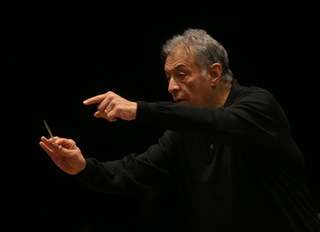|
Back
Mirror, mirror on the wall Lucerne
Kultur Kongresszentrum Luzern
09/07/2009 -
Johannes Brahms: Piano Concerto No. 2
Béla Bartók: Concerto for Orchestra
Yefim Bronfman (piano)
Vienna Philharmonic Orchestra, Zubin Mehta (conductor) 
Zubin Mehta (© Oded Antman)
Not long ago the English music publication “The Gramophone” commissioned a survey amongst its readers, posing the question as to which orchestra they currently considered the best orchestra in the world. Of course in an ideal world, to answer that question fairly, the very same panel of musical judges would listen in identical acoustics to different orchestras playing the same well-known piece under the same conductor and under the same conditions (not exhausted after a long overseas tour or in a hot, humid concert hall, and after the same number of rehearsals). Before I disclose the result of the “Gramophone” survey, I should say that I have just heard many top orchestras in quick succession at the Lucerne Summer Festival – the Philharmonia, the Concertgebouw, the Berlin Philharmonic and now the Vienna Philharmonic, all under top-flight conductors. The Chicago and the Pittsburgh are yet to come. I proffer my apologies to the many other orchestral candidates for the title whom I have not mentioned. “Gramophone” readers voted for the Concertgebouw but on tonight’s performance they are very much on a par with the Vienna Philharmonic.
The Brahms Second Piano Concerto is not primarily a concerto with lengthy sections of piano and occasional orchestral accompaniment but an interplay of themes between soloist and orchestra. Bronfman made light work of the piece’s extreme complexities which Alfred Brendel half-jokingly once described as “technical perversions”. The tub was thumped when it had to be, but generally Bronfman opted for delicacy and lightning finger-work. The orchestra impressed with its silky mellifluous strings, secure firm horns, and golden blended woodwind. Tamas Varga playing the cello solo in the contemplative Andante almost stole the show with his virtuosity.
Bartók’s Concerto for Orchestra is a masterpiece of modern music. It was written in a very gloomy period in the composer’s life after he had emigrated from Hungary to New York and became ill with the leukaemia which was to be his death in 1945, not many years after the work’s composition. Mehta was at home not only with the eerie haunting Hungarian folk-melodies in the slow introduction reminiscent of Bluebeard’s Castle and in the Elegy but also in the angular modern sections such as the Giuoco delle copie and the exciting Finale with its shrieking piccolo at the end. The Intermezzo was played with a good sense of fun bringing to mind Kodaly’s Hary Janos Suite with its sliding trombones. The warm central European woodwind revelled in the timbres of this movement in particular.
Mehta conducted throughout in his inimitable and impressive relaxed style, not a bead of sweat to be mopped from the brow, with stabbing gestures when required. He was rightly annoyed by a tiny amount of audience applause between movements which brought one movement of the Brahms to an early halt, and was re-started only after an angry glance at the audience.
Not long ago the Vienna Philharmonic was unashamedly misogynistic; I counted only three female players, the Principal harpist, a bassoonist and... the Leader no less (though unnamed in the Programme). Progress is being made.
We finished the evening, inevitably, with two Strauss lollipops, Bahn frei complete with railway cap for the percussionist with the whistle and Unter Donner und Blitz sending the audience out smiling onto the still balmy shore of Lake Lucerne.
John Rhodes
|